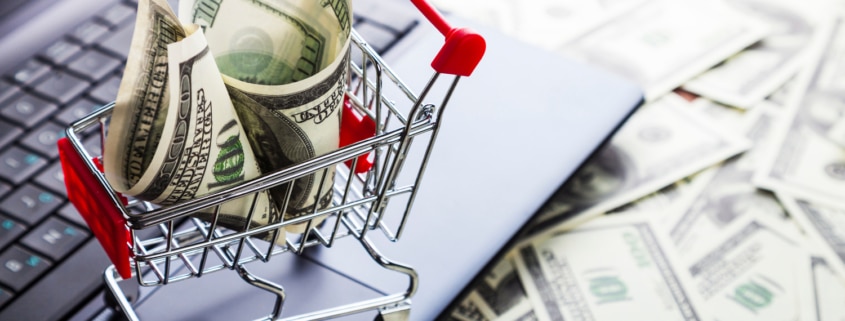5 Things You Need to Know About Maryland Sales and Use Taxes
Understanding the subtle nuances of sales and use taxes can get tricky in a hurry — and accurately compiling, calculating, and filing sales tax returns can be even more difficult. But learning the basics of how these taxes work in the State of Maryland can set you on the path toward financial success.
In this blog, we’re going to help you learn more about Maryland sales and use taxes, and how you can streamline your tax filings in the future.
1. The Basics of Sales and Use Taxes
Every state that charges a sales tax also charges what is known as “use” tax, which is a local tax imposed on goods purchased out of state but used, stored, or consumed within the taxpayer’s home state. This is true whether you purchase these goods in person, online, or over the phone. Here, the use tax rate is the same as the Maryland sales tax rate: 6% for regular sales of tangible goods and 9% for alcoholic beverages (with some variance for specific items).
2. What’s the Point of Sales and Use Taxes?
At first glance, sales and use taxes might seem unfair. After all, these aren’t Maryland-made goods that are being sold, so why is Maryland entitled to taxes on them?
Well, the fact of the matter is that many small businesses purchase their inventory from out of state — or even from outside of the country. If their businesses weren’t allowed to charge the typical Maryland tax rate on out-of-state goods, then they would be at a competitive disadvantage to their consumers and businesses in their neighboring states or countries.
Related Content: I’m Facing a Sales and Use Tax Audit — Help!
3. Special Sales and Use Taxes Events in Maryland
Twice each year, Maryland waives sales and use taxes during special events. These efforts are designed to drive more business for local companies and provide discounts for Maryland residents.
Throughout the second half of February, Maryland residents can purchase qualified Energy Star products or solar water heaters without having to pay any sales tax. This weekend event, called Shop Maryland Energy, typically last from the Saturday that precedes the third Monday of the month through the end of the month and is a great opportunity for retailers and consumers to purchase sustainable products at attractive prices.
Then, from the secondary Sunday of August through the following Saturday, Shop Maryland Tax-Free Week encourages residents to purchase clothing and footwear with no sales tax. All individual qualifying clothes and shoes selling for less than $100 are not charged use tax on the retail sale. Certain other merchandise can also be sold tax-free, but the retailer is still required to pay the state sales tax on these goods. This is a chance to get in some affordable back-to-school shopping, while also having a positive impact on the state’s economy.
4. How to Obtain a Sales and Use Tax License
According to Maryland law, any retailer making sales in Maryland is required to secure a sales and use tax license. Thankfully, this is a fairly simple process that is baked into a one-stop application where business owners can register numerous tax accounts. By completing the Combined Registration Application through the Comptroller of Maryland, you can expedite the process by downloading the form and faxing it directly to (410) 260-7908. Before you begin, please note that you’ll need a federal employer identification number in order to register your business.
5. Sales and Use Tax Exemptions
In Maryland, there are certain goods that are tax-exempt from sales and use taxes, including:
- Machinery and equipment: Any machinery or equipment that will be used as part of production activities is exempt from Maryland sales and use taxes.
- Agriculture/aquaculture: Farm equipment is also exempt from sales and use taxes in Maryland, even if it is attached to real property.
- Repair labor: Any restoration of used property is non-taxable, although fabrication and the purchase of over-the-counter parts are subject to Maryland sales and use taxes.
In addition, the Comptroller’s Office issues sales and use tax exemption certificates to certain qualifying organizations, including:
- Nonprofit organizations
- Nonprofit cemetery companies
- Volunteer fire companies and rescue squads
- Credit unions
- Certain veterans organizations
- Government agencies
There are certain nuances that apply to all these sales and use tax exemption certificates, so you’ll want to work with a knowledgeable tax attorney when completing and filing your annual business taxes.
Interested in Learning More? Contact S.H. Block Tax Services Today!
Navigating sales and use taxes and filing your taxes efficiently can be complex and confusing. And while accurate and intelligent filing can be extremely beneficial, even simple tax law mistakes could cost you dearly with the IRS, which is why it’s important to work with a proven and reputable tax attorney.
At S.H. Block Tax Services, our skilled team of attorneys, enrolled agents, and bookkeepers have decades of experience helping Maryland taxpayers get the most out of their tax returns — and we’d like the chance to do the same for you. Please contact us today by calling (410) 872-8376 or completing this form to learn more about our services and receive a free consultation.
The content provided here is for informational purposes only and should not be construed as legal advice on any subject.




Leave a Reply
Want to join the discussion?Feel free to contribute!